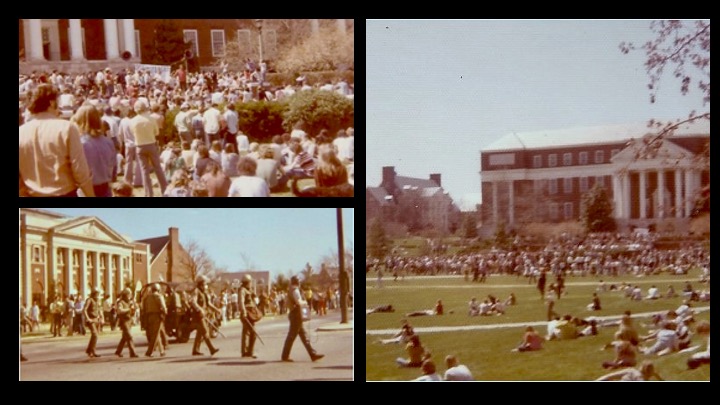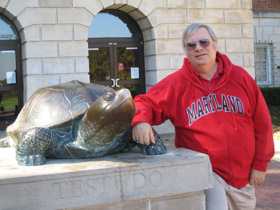Campus Action and Reaction
28/04/24 08:29
 April 28, 2024 (Vol. 18 No. 21) - It shouldn't surprise anyone that protests have broken out on many of our nation's college campuses over the ongoing war in Gaza between Israel and Hamas. As I have noted in this space on several occasions, Israel's response to the October 7 terror attacks has been both justified and excessive to the point of alienating many of its most ardent supporters. Spring campus protests are almost an American right of passage. Above are pictures of my personal right of passage - anti-Vietnam war protests at the University of Maryland on May 1, 1971. There had been even more violent protests one year earlier after President Nixon announced a military incursion into Cambodia. To be truthful, I was more of a small town spectator than a street activist. However, my attitude changed when I was tear-gassed by trigger-happy members of the Prince George's County Sheriff's Department. However, getting back to the present, students today have a right to protest Israel's actions, just as those who support Israel enjoy the same free-speech rights. The rub comes over the time, place and manner of the protests. Protesting students are occupying public spaces, thus disrupting normal campus operations. College administrators are struggling to straddle the fine line that exists between First Amendment rights and legitimate operational and public safety concerns. Their efforts are further complicated by a small percentage of protesters whose rhetoric crosses into the realm of antisemitism. On the top of that is the disingenuous and artificial outrage generated by people like Mini-Mike Johnson, the perhaps not-for-long speaker of the U.S. House of Representatives, and faux-journalistic outlets like Fox News. They are just looking for another way to blame Joe Biden. (I think they blamed Biden for last week's solar eclipse.). And let's be clear on one point: Criticizing Israel and its leadership is not, in and of itself, antisemitic. The struggle between the legitimate right to protest and the need for law and order — especially on college campuses — is as old as the nation, itself. American philosopher Henry David Thoreau challenged the world order in his 1849 essay Civil Disobedience, in which he explained his rationale for refusing to pay federal taxes to support what he felt was the immoral U.S.-Mexican War. He wrote that when a government is unjust, people should refuse to follow the law and distance themselves from that government. Thoreau was a disciple of Ralph Waldo Emerson and Transcendentalism, a belief that people find truth within themselves in the spiritual world. The reality is that people who proclaim they absolutely know what is right and wrong are probably more often wrong than right. One of the great challenges of a democratic society is the ability to find - and respect - the fine balance between competing values. We call those who choose to do so leaders. Those who don't are most often known as MAGA-Republicans. Of course, they will protest that characterization. That's it for now. Fear the Turtle. Photos Copyright David W. Guth, 1971
April 28, 2024 (Vol. 18 No. 21) - It shouldn't surprise anyone that protests have broken out on many of our nation's college campuses over the ongoing war in Gaza between Israel and Hamas. As I have noted in this space on several occasions, Israel's response to the October 7 terror attacks has been both justified and excessive to the point of alienating many of its most ardent supporters. Spring campus protests are almost an American right of passage. Above are pictures of my personal right of passage - anti-Vietnam war protests at the University of Maryland on May 1, 1971. There had been even more violent protests one year earlier after President Nixon announced a military incursion into Cambodia. To be truthful, I was more of a small town spectator than a street activist. However, my attitude changed when I was tear-gassed by trigger-happy members of the Prince George's County Sheriff's Department. However, getting back to the present, students today have a right to protest Israel's actions, just as those who support Israel enjoy the same free-speech rights. The rub comes over the time, place and manner of the protests. Protesting students are occupying public spaces, thus disrupting normal campus operations. College administrators are struggling to straddle the fine line that exists between First Amendment rights and legitimate operational and public safety concerns. Their efforts are further complicated by a small percentage of protesters whose rhetoric crosses into the realm of antisemitism. On the top of that is the disingenuous and artificial outrage generated by people like Mini-Mike Johnson, the perhaps not-for-long speaker of the U.S. House of Representatives, and faux-journalistic outlets like Fox News. They are just looking for another way to blame Joe Biden. (I think they blamed Biden for last week's solar eclipse.). And let's be clear on one point: Criticizing Israel and its leadership is not, in and of itself, antisemitic. The struggle between the legitimate right to protest and the need for law and order — especially on college campuses — is as old as the nation, itself. American philosopher Henry David Thoreau challenged the world order in his 1849 essay Civil Disobedience, in which he explained his rationale for refusing to pay federal taxes to support what he felt was the immoral U.S.-Mexican War. He wrote that when a government is unjust, people should refuse to follow the law and distance themselves from that government. Thoreau was a disciple of Ralph Waldo Emerson and Transcendentalism, a belief that people find truth within themselves in the spiritual world. The reality is that people who proclaim they absolutely know what is right and wrong are probably more often wrong than right. One of the great challenges of a democratic society is the ability to find - and respect - the fine balance between competing values. We call those who choose to do so leaders. Those who don't are most often known as MAGA-Republicans. Of course, they will protest that characterization. That's it for now. Fear the Turtle. Photos Copyright David W. Guth, 1971